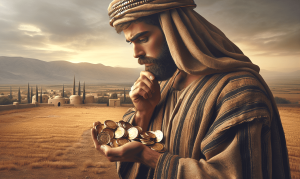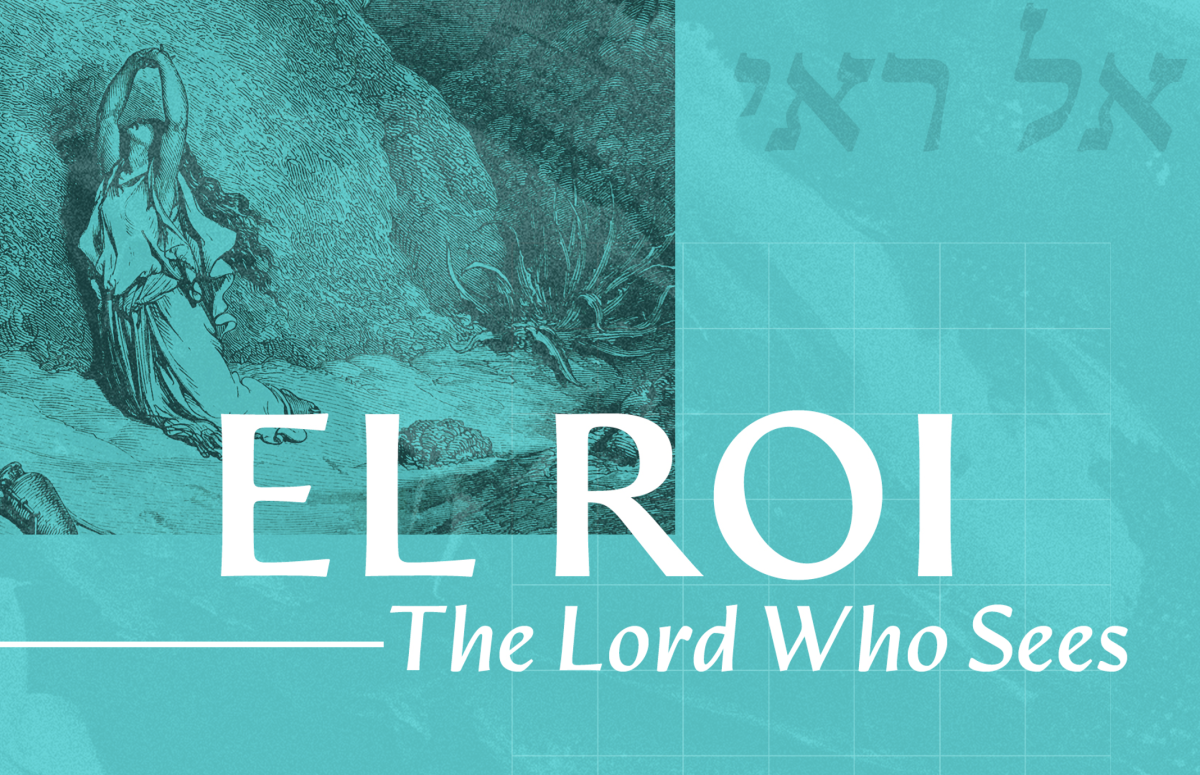The God Who Sees: Finding Hope in Life’s Messy Moments
Life rarely unfolds according to plan. We often find ourselves caught in situations we never anticipated, grappling with the consequences of our choices or the actions of others. In these moments, it’s easy to feel lost, unseen, and alone. But what if there’s a God who sees us in our messiest moments? A God who meets us in our wilderness and offers hope?
The story of Hagar in Genesis 16 beautifully illustrates this truth. Here we encounter a young Egyptian slave girl, caught in the middle of someone else’s story. Abram and Sarai, unable to conceive, devise a plan that involves Hagar bearing a child for them. It’s a messy situation from the start, fraught with cultural complexities and human frailty.
When Hagar becomes pregnant, tension erupts. Sarai, feeling threatened, mistreats her. Hagar, desperate and alone, flees into the desert. It’s here, in her darkest moment, that something extraordinary happens. The angel of the Lord appears to her and asks two profound questions: “Where have you come from, and where are you going?”
These questions resonate deeply with our own journeys. How often do we find ourselves running, without a clear sense of direction? Perhaps we’re fleeing from pain, from mistakes, or from the consequences of our actions. Or maybe, like Hagar, we’re victims of circumstances beyond our control.
In this pivotal moment, God reveals Himself as “El Roi” – the God who sees. He sees Hagar in her distress, acknowledges her pain, and offers her hope. This divine encounter transforms Hagar’s perspective. She exclaims, “I have now seen the One who sees me.” In her lowest moment, Hagar experiences the profound reality of being truly seen and known by God.
This story challenges us to consider: Do we believe in a God who truly sees us? Not just our outward appearance or the carefully curated image we present to the world, but our true selves – with all our flaws, fears, and failures?
The concept of being fully seen can be both comforting and terrifying. We long to be known, yet we fear exposure. Like Adam and Eve in the garden, our instinct is often to hide, to cover ourselves with fig leaves of pretense and self-protection. But God invites us into a different response – one of vulnerability and trust.
Interestingly, God’s instruction to Hagar is unexpected. He tells her to return and submit to Sarai. This isn’t a call to endure abuse, but rather an invitation to trust God’s larger plan. Sometimes, the path forward involves facing our challenges rather than fleeing from them. It requires faith that God is working, even in situations that seem hopeless.
This story reminds us that God often reveals Himself in surprising ways and through unexpected people. It wasn’t through the great patriarch Abram that this aspect of God’s character was revealed, but through a lowly slave girl. This speaks volumes about God’s heart for the marginalized, the overlooked, and those who feel they don’t matter.
The narrative of Hagar challenges our tendency to judge based on outward appearances or societal status. It reminds us that every person has inherent worth and dignity in God’s eyes. No one is too lowly, too messy, or too far gone for God to see, to love, and to use for His purposes.
Moreover, this account illustrates that God’s plans are not derailed by human mistakes. Yes, Abram and Sarai’s attempt to “help” God fulfill His promise led to complications. But God wasn’t caught off guard. He wove even this misstep into His larger narrative of redemption.
This truth offers hope to all of us who have made mistakes, who have veered off course, or who feel we’ve disqualified ourselves from God’s purposes. The God who sees doesn’t just observe our messes from afar. He enters into them, offering guidance, hope, and the promise of redemption.
The story of Hagar invites us to pause and reflect:
- Where have we come from? What’s our story? Have we acknowledged the journey God has brought us through?
- Where are we going? Are we purposefully moving in a direction, or simply running away from something?
- Do we truly believe that God sees us – not just our outward actions, but our hearts, our struggles, our deepest longings?
- How might God be speaking into our current situation? Are we willing to listen, even if His guidance challenges our preferences?
- In what ways might we be hiding from God or others? What would it look like to allow ourselves to be truly seen?
The message of El Roi – the God who sees – is a powerful antidote to the isolation and invisibility many of us feel. It reminds us that no matter how insignificant we may feel, how messy our lives may be, or how far we’ve strayed, we are never out of God’s sight or beyond His reach.
This truth doesn’t promise an easy path. Hagar’s life didn’t suddenly become problem-free. But knowing she was seen by God gave her the strength to face her challenges. It reframed her story, not as that of a helpless victim, but as someone playing a significant role in God’s unfolding plan.
As we navigate our own messy moments and wilderness experiences, may we find comfort and courage in the God who sees. May we allow ourselves to be fully seen, trusting that in His sight, we find our true identity and purpose. And may we, like Hagar, become more attuned to seeing God at work in our lives, even in the most unexpected places and challenging circumstances.
The invitation is clear: Stop running. Allow yourself to be seen. Trust that the God who sees you is also the God who can redeem your story and work all things together for good. In your mess, in your wilderness, in your moments of feeling lost and alone – remember, you are seen. And in being seen by El Roi, you can find the strength to face whatever lies ahead.
—–
Here’s a 5-day Bible reading plan and devotional guide for your week:
Day 1: The God Who Sees
Reading: Genesis 16:1-16
Devotional:
In the midst of life’s chaos and our own mistakes, it’s easy to feel unseen and forgotten. But the story of Hagar reminds us that God sees us, even when we feel invisible. He is El Roi, the God who sees. Reflect on times when you’ve felt overlooked or caught in circumstances beyond your control. How might embracing God’s all-seeing nature change your perspective? Today, rest in the knowledge that you are fully known and deeply loved by your Creator.
—–
Day 2: Running and Returning
Reading: Jonah 1:1-17
Devotional:
Like Hagar, Jonah ran from God’s call. We often flee from difficult situations or responsibilities, thinking we can escape God’s plan. But God pursues us with relentless love. Where are you running in your life? What might God be asking you to return to or face? Remember, submission to God’s will, though challenging, leads to His blessings and purpose for your life. Pray for the courage to stop running and instead run towards God.
—–
Day 3: The Mess and the Promise
Reading: Romans 8:28-39
Devotional:
Abraham and Sarah’s story shows that even people of great faith can make messy mistakes. Yet God’s promises prevail. In your own life, where do you see messes that seem to contradict God’s promises? Today’s passage reminds us that God works all things for good for those who love Him. How might God be working in your mess? Trust that His promises are greater than your mistakes, and He can bring beauty from ashes.
—–
Day 4: Removing the Mask
Reading: Psalm 139:1-18
Devotional:
We often wear masks, hiding our true selves from others and even from God. But today’s Psalm reminds us that God knows us intimately and loves us completely. What masks are you wearing? What parts of yourself are you afraid to expose to God or others? Spend time in prayer, allowing God to see you fully. Ask for the courage to be authentic before Him and others, trusting in His unfailing love.
—–
Day 5: Blessed in the Mess
Reading: 2 Corinthians 12:7-10
Devotional:
Like Paul’s thorn in the flesh, we all have struggles that persist despite our prayers. Yet God’s grace is sufficient, and His power is made perfect in our weakness. Reflect on your own persistent challenges. How might God be using these to reveal His strength and grace? Instead of asking for removal of your “thorn,” pray for God’s presence and power to be manifest in your weaknesses. Remember, it’s often in our messes that God’s blessings shine brightest.

It’s The Little Things
The Kingdom of God: Ownership, Faithfulness, and the Little Things Have you ever felt like God was a harsh taskmaster, just waiting for you

Seeking Wisdom Is Underrated
The Pursuit of Wisdom: A Path to Lasting Success Quick decisions and instant gratification is our culture’s calling card. However, there’s a timeless truth

Staying Hallowed On Halloween
Staying Holy in a Dark World: Navigating Halloween as a Christian As October rolls around each year, many Christians find themselves wrestling with how

Are You A Pillar Or A Prop?
Embracing the Noble Task: A Call to Leadership and Purpose Titles, status, and personal gain are huge drivers of worldly culture. Unfortunately those same

Time To Dig Deep
Building on Solid Ground: The Call to Dig Deep in Faith When things feel all topsy-turvy, we yearn for something unshakeable: a foundation that

Older Brother Syndrome
The Prodigal Wasn’t The Only Son We’ve all heard the story of the prodigal son – the wayward child who squanders his inheritance, only

